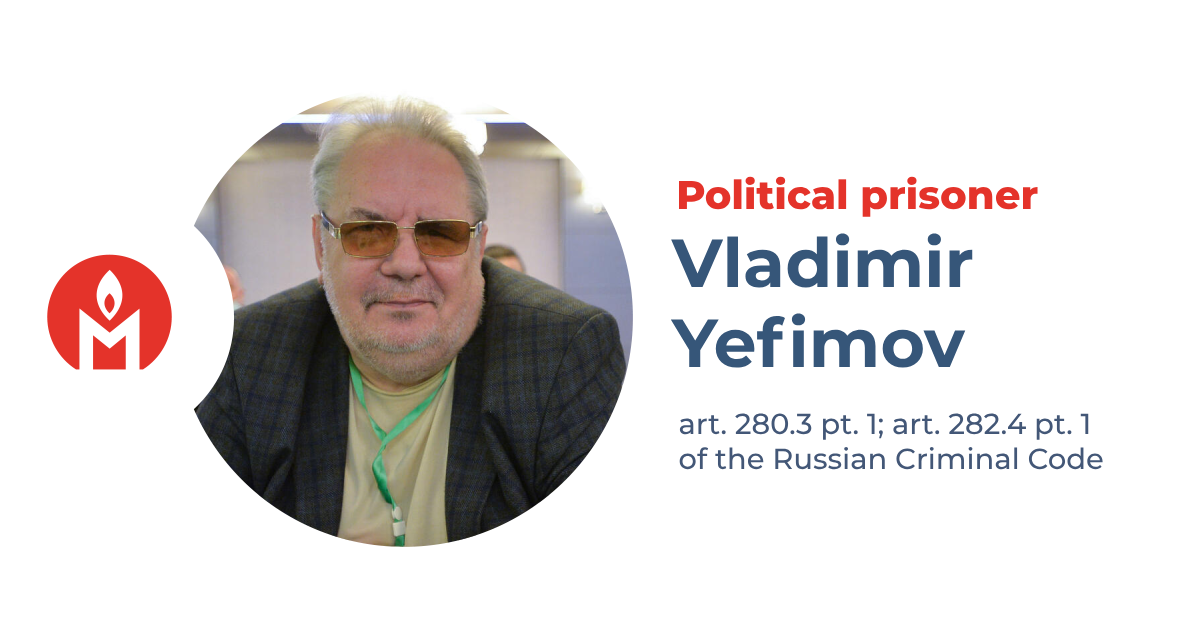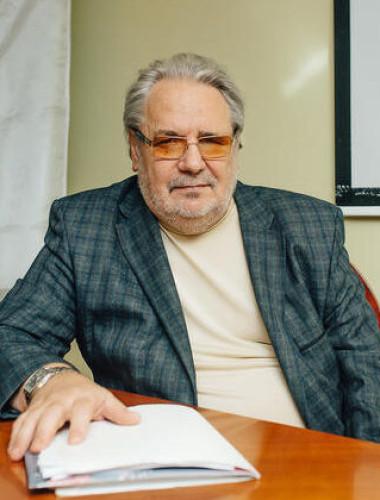Vladimir Yefimov is a political prisoner
The head of the Kamchatka branch of the Yabloko party has been sentenced to two years in a low-security penal colony on charges of ‘discrediting’ the Russian army and displaying Nazi symbols.
The ‘Political Prisoners. Memorial’ human rights project, in accordance with international standards, considers Vladimir Yefimov a political prisoner. Yefimov was convicted of repeated ‘discrediting’ of the Russian military and repeated display of Nazi symbols for anti-war posts on Facebook. Yefimov’s criminal prosecution and conviction violated his rights to freedom of expression and a fair trial. We demand Vladimir Yefimov’s immediate release and that all criminal charges against him be dropped.

Who is Vladimir Yefimov and what were the charges against him?
Vladimir Yefimov is a politician and journalist from Petropavlovsk-Kamchatsky and the leader of the regional branch of Yabloko, a political party.
Yefimov repeatedly spoke out against the Russian invasion of Ukraine on his Facebook page. In 2022, he was fined ten times under administrative law for these statements. On 21 May 2022, a criminal case was opened against him for repeated ‘discrediting’ of the Russian army (Article 280.3, Part 1 of the Russian Criminal Code). On 31 March 2023, he was sentenced to a fine of 200,000 roubles. However, in June 2024, following a prosecutor’s appeal, the fine was quashed and replaced with probation.
In November 2023, a second criminal case was opened against Yefimov, again for repeated ‘discrediting’ of the Russian army (Article 280.3, Part 1) and also for repeated display of Nazi symbols (Article 282.4, Part 1). The charges were based on a Facebook post in which Yefimov compared the Russian pop singer Shaman (Yaroslav Dronov) to a Hitler Youth character from Bob Fosse’s film Cabaret.
In August 2024, a third criminal case for repeated ‘discrediting’ of the Russian army was filed against Yefimov (Article 280.3, Part 1). Yefimov was then remanded in custody, but on 18 October 2024 was placed under house arrest. On 27 January 2025, Yefimov was sentenced on this charge to two years in a low-security penal colony. The term was later reduced to 18 months on appeal.
Finally, on 4 April 2025, Yefimov was convicted and sentenced in the second criminal case against him on the charges of repeated ‘discrediting’ of the Russian army and repeated display of Nazi symbols. Under the cumulative sentences, the court handed down a final sentence of two years in a low-security penal colony, with an additional three-year ban on publishing online.
Why do we consider Vladimir Yefimov a political prisoner?
Article 280.3 of the Russian Criminal Code, criminalising repeated ‘discrediting’ of the army, was introduced after the beginning of Russia’s full-scale invasion of Ukraine to silence dissent. It effectively criminalises any criticism of the war or the authorities, in violation of the civil right to freedom of expression. The article also contradicts one of the fundamental principles of law, that of legal certainty. The article must be repealed, and all related convictions, including that of Vladimir Yefimov, quashed.
The charge of displaying Nazi symbols is absurd. In his Facebook post, Yefimov shared a clip from the well-known film Cabaret, comparing one of the characters in the film, a Nazi member of the Hitler Youth, to performances by the singer Shaman. The post was clearly a critique of both German Nazism and the exploitation of fascist aesthetics by contemporary Russian cultural figures.
The prosecution of Vladimir Yefimov, who is 70 years old, is based on his public and consistent criticism of the war against Ukraine. Imprisonment at his age poses a serious risk to his health.
A detailed description of Vladimir Yefimov’s case and of our position is available on our website.
Recognition of an individual as a political prisoner does not imply the ‘Political Prisoners. Memorial’ human rights project agrees with, or approves, their views, statements, or actions.
How can you help?
You can donate to help all political prisoners in Russia.
